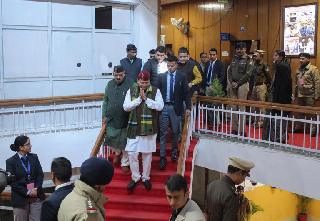Saturday, July 27, 2024
Latest News
Uttarakhand Passes The UCC Law But Yet To Be Approved By Indian President
Thursday - Feb 8, 2024

New Delhi: The Indian state of Uttarakhand became the first in the country to pass a contentious bill that will establish a unified personal law for all citizens irrespective of their religion. The landmark Uniform Civil Code was passed late Wednesday following two days of discussion after it was introduced by Uttarakhand chief minister Pushkar Singh Dhami. The law – opposed mainly by Muslim minorities – has remained one of the main promises of prime minister Narendra Modi’s Hindu nationalist ruling Communal Bharatiya Janata Party (BJP).
Mr Dhami called it an “important day” for the state and thanked Mr Modi for his strong support and encouragement. Uttarakhand’s approval has now set the stage for other BJP-ruled states to pass similar legislation ahead of the next general election in which Mr Modi is confident to secure a third term in office.
It will be now approved by president Draupadi Murmu before it becomes law. The code means that there will be a single set of laws for all residents of the state irrespective of religion, sex, gender and sexual orientation on matters such as marriage, divorce, inheritance and adoption. It will override the different laws and customs that are followed by Hindus, Muslims, Christians and other minority groups currently on various personal matters. The new law bans polygamy and sets a uniform age for marriage for men and women – 21 and 18 respectively – across all religions and also includes a uniform process for divorce.
One of the contentious features of the law will require the couples in live-in relationships to register themselves with the authorities and non-compliance would mean punishment of up to six months in prison, a fine of up to Rs 25,000 (£239), or both.
Under the law, officials could reject or accept their registration and partners would be required to declare termination of their relationship in case of separation. Children born out of such relationships will be considered legitimate offspring of the couple, inheriting all legal rights available to those born within a traditional marriage.
The law excludes Scheduled Tribes that constitute three per cent of Uttarakhand’s population. Opponents of the law have called it an interference in their faith and said the Modi government is using it for electoral benefit.
India, the world’s most populous nation with more than 1.4 billion people, is home to around 80 per cent Hindus and 14 per cent Muslims. Muslims accuse Modi’s right-wing party of pursuing a Hindu agenda that discriminates against them and directly imposes laws interfering with their faith. "This is a nefarious political design to drive a wedge in the society on religious lines," said Yashpal Arya, an opposition Congress party lawmaker.
Asaduddin Owaisi, president of the All India Majlis-e-Ittehad-ul-Muslimeen, said the legislation is merely a Hindu code that applies to all. "I have a right to practice my religion and culture. This bill forces me to follow a different religion and culture. In our religion, inheritance and marriage are part of religious practice," he said on X, formerly Twitter.
Mr Dhami, the top elected official in Uttarakhand state, however, said the law is not to target any religion but to remove complexities. "This law is about equality, uniformity and equal rights. There were many doubts regarding this, but the two-day discussion in the Assembly clarified everything. This law is not against anyone. It is for women who have to face difficulty because of the social norms. This will strengthen their self-confidence,” he said.
All India Muslim Personal Law Board said the law goes against India’s principle of diversity and is “inappropriate” and “unnecessary”. “The bill is unnecessary, and goes against the principle of diversity. Its primary target appears to be Muslims, especially since even (some Indigenous tribes) have been exempted,” it said in a statement. Mr Dhami said the bill will be amended in future as the need arises.
No comments posted...